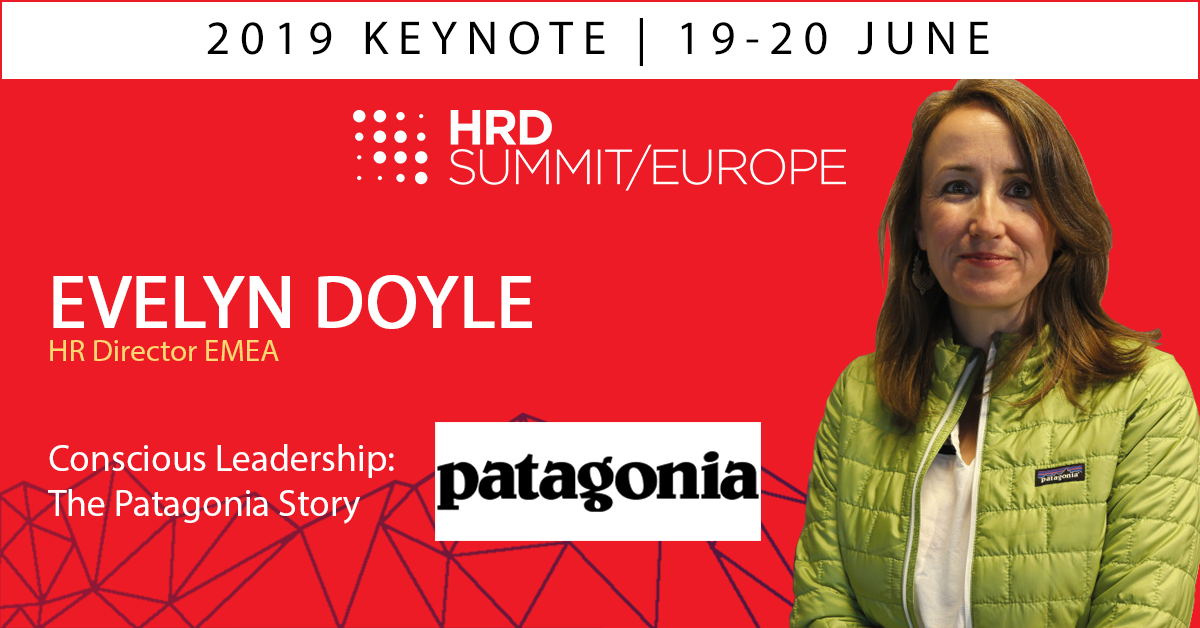Leading a conscious organisation: Evelyn Doyle, HR Director EMEA, Patagonia
- 7 Min Read
Ahead of her appearance at the HRD Summit EU at the RAI Amsterdam, June 19th-2oth, Evelyn Doyle, HR Director EMEA, Patagonia, sat down with HRD Connect for a conversation on consciousness, and the leadership model of the future.
- Author: Michael Hocking
- Date published: Apr 11, 2019
- Categories

Patagonia have paved the way for a new kind of organization – a world-beating brand with conscious values woven into the fabric of their brand and business model.
How can other organizations learn from Patagonia’s example? The secret might be in the way we lead our employees.
Ahead of her appearance at the HRD Summit EU at the RAI Amsterdam, June 19th-2oth, Evelyn Doyle, HR Director EMEA, Patagonia, sat down with HRD Connect for a conversation on consciousness, and the leadership model of the future.
What does it mean to be truly ‘conscious’ – as a leader and as an organisation?
We have always been a mission driven company and we stood on new ground when we developed our first mission statement in 1991: ‘’Build the best product, cause no unnecessary harm and use business to inspire and implement solutions to the environmental crisis.’’
As we continue in business the world continues to become more complex, volatile and uncertain and our production and consumption cycle is impacting our planet. This is a time for business to have a voice beyond the narrow world of what we produce and for leaders of these businesses to be conscious leaders. More than ever before, customers want their purchases to stand for something. They want to engage with brands that care about more than the bottom line. Leaders who are in the gray area who don’t take positions on the issues of the day are being forced to ask questions. They are seeing incredible pressures from their community and their employees.
Our founder, Yvon Chouinard challenged us to think bigger, to recognize that all life on Earth is facing a critical moment and to evolve our mission statement to reinforce the urgency of the crisis. The danger the climate crisis poses is no longer a forecast. We know it and see it: Extreme weather, sea level rise, the die-off of species, desertification of our farmland, evaporation of our rivers. And we have a responsibility to act and our new mission statement is We’re in business to save our home planet. Most recently, we have invested in Regenerative Organic Agriculture because it shows promise to reverse the climate crisis. It also yields healthy soil, protects and enhances biodiversity, and improves water quality and retention. Most exciting is the potential of these agricultural methods to capture carbon from the atmosphere, where it’s trapping heat and cooking our home planet, and store it deep into the soil. According to Rodale Institute, switching the world’s croplands and pastures to regenerative organic agriculture could remove more than 100 percent of the world’s annual carbon emissions. We’ve also set ourselves the goal of being carbon neutral (and even carbon positive) across our entire business, including our supply chain, by 2025.
Is it possible for every organisation to become conscious in this way? What do you think are the blockages?
I believe so. While we have been vocal about standing up for the planet, we are creating a great, durable product. This is fundamental to our success. And it is a product our customers can feel good about – we carry more Fair Trade certified products than any other apparel brand as a % and we have the most rigorous environmental standards for our supply chain. We are also heavily investing in innovation — allowing us to create new supply chains and increase our reliance on recycled and non-virgin materials. By 2025, we will use only renewable or recycled materials in our products. By this fall, almost 70 percent of our materials will be recycled or renewable.
Companies that don’t contribute to society’s well-being are the ones that face more brand risk and more backlash from their communities and their employees. At Patagonia, over the course of our company’s history, we have seen that a strong commitment to environmental advocacy connects us closer to our community of passionate outdoors people and helps us grow. Not only is advocacy good for business, it also helps attract amazing talent – from college interns to seasoned leaders. More than 9,000 people applied for 16 internship positions at Patagonia last summer – it was the smartest, most diverse, and passionate class of interns we had ever had. And it is not just because we have a great culture that supports the blended self at work – it is because we prioritize the planet over profit, our values over quarterly earnings.
Is there a leadership archetype on which all aspiring leaders should model themselves?
I think the most important thing you can be as a leader now is to be self-aware, be conscious, be authentic and lead from the We and not the I. You need to be conscious of the impact from an organizational perspective of people, planet and profit. I think if you are aspiring to be a conscious leader then you must be connected to yourself, know yourself deeply and know what are you willing to take a stand on? The Bio-Leadership model I think can develop new forms of development and change that is fitted to the VUCA world we live in. The need to shape new ways of living and working – a new organizational eco system which allows for a more adaptive, connected and regenerative way of being. The is particularly important to the rising importance of purpose and meaning across life and work for employees.
Which current trend or concept in HR do you think leaders aren’t paying enough attention to? Which do you think is receiving too much attention?
I think that there is a need and it is good to focus on technology development and data management and the role of HR in ensuring good data for decision making purposes and implementing effective technology to allow for more nimble organizations.
I think a lot of organizations could pay more attention to looking at systems change and spending time researching the best organizational design set up and structure that allow for employees and leaders to work in a cohesive, nimble, collaborative and entrepreneurial way. HR can play a very important role in dedicating time and focus on Bio-Leadership development. I have partnered with Andres Roberts from the Bio-Leadership project and his work on Bio-Leadership addresses
- The need to shape new ways of living and working in more adaptive, connected and regenerative ways.
- The need to protect and restore the wider social and ecological systems we are part of.
- The rising importance of purpose and meaning across life and work.
Considering the actions and influences of some of the foremost leaders in the world today, do you think the concept of an individual ‘leader’ is outdated? Is it time to consider a different model for leadership?
Even though some individual leaders create more harm than good I do believe individual leadership can still be a force for good – if they come at leadership from a humble, conscious perspective. Look at Jacinta Ardern and her actions after the Christchurch massacre. She acted with empathy, authenticity and from an inclusive leadership style. She also took a stand and made concrete decisions. She was not driven by ego. She was very conscious about the fact that how she reacted and acted would ultimately determine how her people acted.








